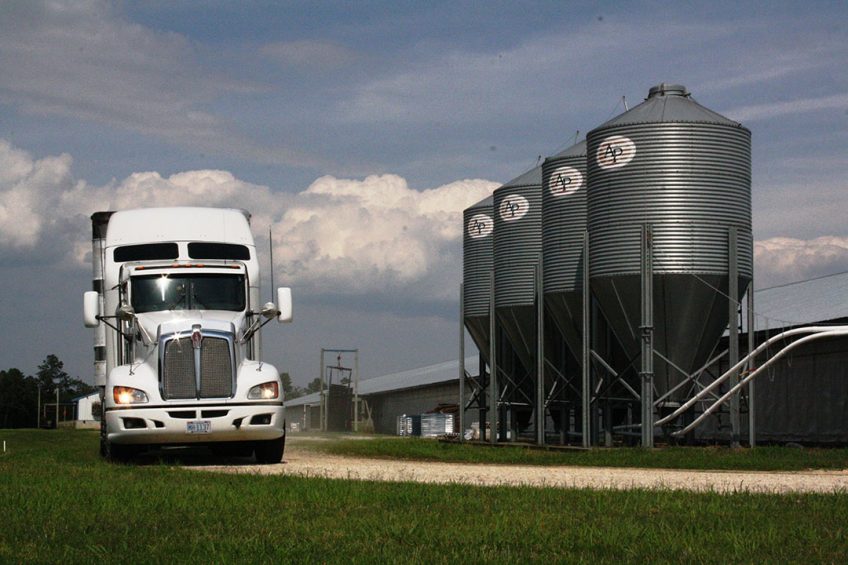Covid-19: US pig backlog sparks interest for automation

As US packing plants struggle with a historic pig backlog, euthanasia continues. Small slaughterhouses are also backlogged for pig processing into next year, at the same time demand at US food bank soars and interest is growing in automation in slaughterhouses.
Over the last few months, Covid-19 has caused extensive reduction in US pork packing plant capacity through worker infections, temporary closures and new safety measures. The National Pork Producers Council recently estimated that from late April to mid-September this year, up to 10 million hogs may need to be euthanised.
Backlog at small packing plants
Reduced capacity at the nation’s largest packing plants has spilled over into a backlog at small slaughterhouses, which process at most 1% of American hogs. Reuters news agency reported this week that some small processors are booked up for pig processing as far ahead as June 2021.
Compensation for losses for hogs and pigs
Under the Coronavirus Food Assistance Program, the USDA will provide billions of dollars directly to farmers impacted by the pandemic. The programme began accepting applications this week on May 26. Payments for loss of income will be based on the number of ‘hogs’ (pigs over 120 pounds/54 kg) and ‘pigs’ (under 120 pounds/54 kg) sold by a given farmer between January 15 and April 15 this year at a the rate of $ 18/head for hogs and $ 28 for pigs. Compensation for other costs will be based on each producer’s unpriced hog and pig inventory between April 16 and May 14 a rate of $ 17/head for both hogs and pigs.
Pork for the needy
At the same time, nearly 39 million Americans have lost their jobs due to the pandemic and reliance on food banks has risen sharply, reports Josh Funk of the Associated Press. The US Department of Agriculture (USDA) and some state governments have therefore arranged to purchase food, including pork, from farmers so that the food goes to the needy instead of being disposed of. In Iowa, farmers have so far donated over 360 pigs to be processed into pork for local food banks.
Attention to automation on meat packing plants
Large outbreaks, some deaths and temporary closures at US meat packing plants due to Covid-19 has led to increasing interest in plant automation, according to Eve Sneider in a new story in Wired Magazine.
Sneider pointed out that the extensive level of automation across the 18 plants in Denmark owned by Danish Crown has played a role in their staying open and running at full capacity during the pandemic. Danish Crown’s pig slaughterhouse in Horsens, Denmark is one of the largest in the world and is considered to be the most advanced in terms of automation.
The US pork packing plant that is likely the most automated in the US, reported Sneider, has also been able to stay open despite Covid-19. The Clemens Food Group facility in Coldwater, Michigan requires 300 fewer workers than other plants that process the same volume of pork.

Covid-19 Up-date
What impact is the pandemic having on the global pig sector and how are they dealing with it.
Canada: automation on the table
Automation at packing plants in Canada is one topic now being discussed by the Canadian Meat Council (CMC) with various industry stakeholders, along with new Covid-19 infection prevention measures that may be added in coming months, reported the Canadian Press.
Canada’s federal government will provide $ 77.5 million starting in September to allow the nation’s entire food-processing industry to make changes to plants impacted by Covid-19. However, CMC president Chris White said there are questions about the fact that any retrofits relating to automation at meat packing plants would likely require shutdowns.
Interest in alternative proteins
At the same time US pork farmers and processors are dealing with many Covid-19 challenges, interest in meat alternatives has reached record levels. The Good Food Institute claimed that investment in plant-based and cell-based (vat-grown meat) alternative protein totaled $930 million in the first quarter of 2020, setting a new record and exceeding by 11% the extensive investment in the sector during the 1st quarter of 2019.
In addition, research firm Nielsen reported that sales of alternative proteins in late March 2020 were 255% higher than during the same period last year. “The crisis has encouraged a sense of new-product discovery in this category,” Jaime Athos, CEO of alternative protein company Tofurky recently told Forbes Magazine. Athos says consumers have been affected by temporary closures of packing plants and disruptions to meat supply chains.
Last week, Matt Simon also reported in Wired Magazine that alternative protein-makers like Impossible Foods and Beyond Meat, which already have products in major fast food chains and grocery stores across the US, have ‘considerable’ potential to scale up current production.
Discrimination based on presumed exposure
Many people in the US who work in meat packing plants are Latino, and the Guardian reported this week that some are “being refused service after more than 10,000 meatpacking workers, many Latino, contracted Covid-19 in the US.” Some Latinos have reportedly been “turned away from grocery stores… because they were presumed to have the coronavirus.”











